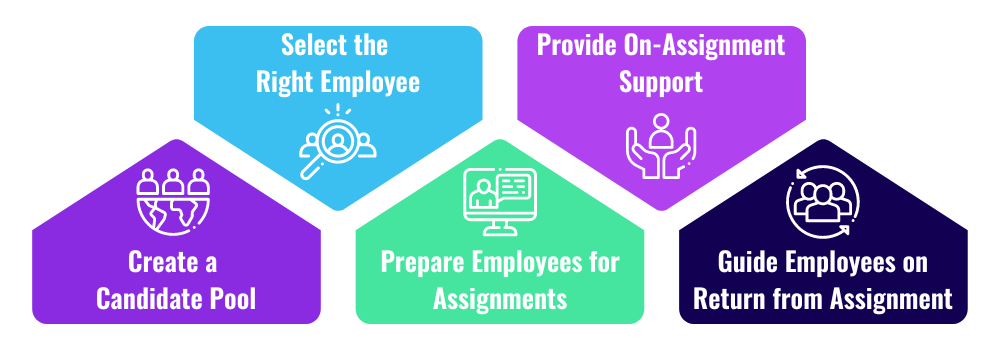Blog
USING INTERCULTURAL ASSESSMENT AND TRAINING TO DEVELOP TALENT
Integrating intercultural training and assessments into your organization’s overall talent management process throughout the entire employee life cycle, versus just before international assignments, offers many benefits and advantages. First, it allows you to offer continuous learning and development opportunities for your employees. These opportunities help create pools of candidates that are ready for the next step in their career. Second, employees continuously develop competencies that are necessary for success in a global work environment.
Sirva understands the importance of developing employees’ cultural competencies throughout the employee lifecycle. We work with organizations to help them:

Following are best practices for creating a candidate pool that is ready for global opportunities, choosing the right employees for international assignments, getting them ready for assignment, supporting them while in their new location, and providing support when they return from the assignment.
|
| Having pre-qualified individuals ready to be considered for assignments is key when global business needs arise. Using candidate assessment and selection tools is one way to develop a robust pool of candidates. |
Sirva’s Global Assessment Inventory, a proprietary tool for self-assessment, guides employees through a series of questions to measure attributes related to success in multicultural environments, which is essential when working with individuals from different backgrounds and cultures. Depending on the outcome of the assessment, you can add those individuals to your candidate pool to be considered when global opportunities arise.
While the Global Assessment Inventory helps your organization develop a talent pool, it also provides benefits for your employees. Upon completion of the tool, employees receive a report that outlines their areas of strength and highlights development opportunities. This gives the individual the chance to focus on specific areas to improve their cross-cultural effectiveness and helps them prepare to be a candidate for future international opportunities.
|
You can rely on your candidate pool as a source of prospective employees for international work opportunities. However, you may need additional support in selecting the right employee for an opportunity. There are several ways to ensure the best person is chosen from the pool.
In addition to using results from a self-assessment tool, potential candidates and their partners could participate in a more formal candidate assessment process that includes a candidate assessment tool, such as Sirva’s proprietary Overseas Assignment Inventory, behavioral interview with a certified Intercultural trainer, and risk assessment report. The Overseas Assignment Inventory evaluates cultural adaptability and measures attributes essential for successful adaptation to another culture. It also evaluates context factors that can either support or deter expatriates from completing a successful assignment.
| To confirm you are selecting the right person for the opportunity, you may elect to use candidate assessment services with multiple employees. A thorough review of the detailed risk assessment report can help you confidently move forward knowing you have chosen to send someone on assignment that is likely to succeed, both on the job and in the new culture. |
|
When an employee is chosen for an assignment, it is essential to ensure that he or she is well prepared for both the move and acclimation to the new location by providing intercultural training for the employee and any accompanying family members.
Customized intercultural training programs, such as Sirva’s Developing a Global Mindset training programs, help them develop the awareness, knowledge, and skills to have the global mindset and competencies to succeed. They also can address any concerns the employee and family may have about what to expect in their host country. Why is the training beneficial? Through training, employees and their families will understand the impact of culture in business and social relationships; learn vital information about the country of assignment; and develop skills for successful adaptation to life and work in the host country. Intercultural training programs include information about the language, customs, cultural and diversity sensitivities, and communication styles, as well as exploring how people in the host country might perceive the relocating employee and family.
One thing to remember is that accompanying partners are the ones who will likely engage most often with locals in the host country. They derive a great deal of benefit from dedicated training about what to expect as an accompanying partner in the new culture, and the support they can receive during the transition. Accompanying school-aged children benefit through an early and thorough understanding of the assignment location, what schools will be like, how to make new friends, and how to connect with other children at their school to make the transition easier.
| Upon completion of training, employees and their families will have realistic expectations and a better sense of everyday life in the new culture, as well as strategies for adjustment. The employee will also have a better understanding of global management and leadership models to ensure success in the workplace. |
|
| Intercultural training is not a one-time event; training and coaching can be offered throughout the assignment to provide ongoing support. Types of follow-ups can include targeted cultural skills development when responsibilities change or expand, and well-being support for accompanying partners. |
When you provide this type of ongoing support for your on-assignment employees, you not only increase the odds of assignment success for the employees and families, but also demonstrate your commitment to employees’ success on assignment.
|
Returning to one’s home country after an assignment can be a difficult transition. Oftentimes, the focus is on the expatriation process, however many relocating employees need as much support returning to their home country as when they left. Employees and families don’t often expect things to change when they are on assignment. Providing employees with a repatriation training program, such as Sirva’s Leveraging a Global Mindset training program, helps the employee and their family with the adjustment back to their life after the assignment.
| Repatriation programs help employees reflect on their experiences abroad and identify strategies to incorporate those experiences into everyday life back in the home country. Additionally, employees and their families identify and develop strategies to support their reintegration including how to work through re-entry concerns, addressing reverse culture shock, and other repatriation management strategies like maintaining friendships from abroad and reconnecting with people at home. |
In Summary
Sending the right person on the right assignment can be a powerful tool for your business. It is important that global mobility leaders recognize that employee selection is only the first step. Providing support to employees and families while on assignment and upon their return is pivotal to overall success. Candidate assessment solutions and intercultural training are powerful tools that companies can incorporate to achieve their overall talent management and business goals while strengthening their leadership ranks.
To learn more about Sirva’s tailored solutions to support candidate assessment and selection, intercultural training and cultural coaching, visit the Talent Development & Intercultural section of our website.


 Create A Candidate Pool
Create A Candidate Pool Select the right employees
Select the right employees Preparing Employees for Assignments
Preparing Employees for Assignments Providing On-Assignment Support
Providing On-Assignment Support


